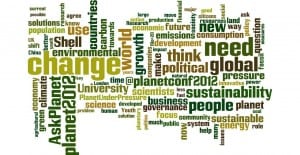Feeling the squeeze
By Katherine E Welch, on 23 April 2012
The consensus of the academic community gathered at the Planet Under Pressure conference in London at the end of March seemed to be that the pressure is indeed on, and change is needed – now.
The conference, pegged as the largest gathering of global experts on environmental and social issues in the lead up to Rio+20, aimed to send a clear message to those gathering in Brazil in June about the challenges the planet now faces. Indeed, the conference organisers, in a declaration on the state of the planet, said that safeguarding the Earth’s natural processes to ensure the wellbeing of civilisation was the defining challenge of our time.
Climate change, the global financial crisis and food, water and energy insecurity threaten civilisation as we know it – Ban Ki-moon, UN Secretary General
The sense of urgency from speakers was palpable, and their warnings stark. Population growth, increasing urbanisation and ever-greater resource demand are placing increasingly unsustainable pressures on the natural system, with many systems now believed to be at thresholds or “tipping points” beyond which changes can not be reversed.
Welcome to the Anthropocene
It now seems increasing difficult to deny that as a species we have changed the planet in unprecedented ways. Consensus is growing that we have driven the Earth into a new epoch – the Anthropocene – where the natural system is dominated by human activity.
Many of the traditional measures of human impact on the environment, from CO2 and ozone depletion to GDP, urban population and, of course, resource consumption have changed rapidly since the start of the industrial revolution, and dramatically in the post-war period (since around 1950).
The conference organisers commissioned a three-minute video showing the growth of cities, roads, rail, shipping and air travel since the start of the industrial revolution, and the impact this has had on natural systems.
What is more, Professor Sybil Seitzinger, Executive Director of the International Geosphere-Biosphere Programme, based at the Royal Swedish Academy of Sciences, commented in her presentation that having already crossed the threshold of more than 50% of the global population living in urban areas, over the next 40 years we will need to build a city of one million inhabitants every week in order to match population growth. This will require still greater exploitation of natural resources.
Time for change
All is not lost, however. “Population growth is slowing and will level off; the intensity of energy and carbon required for a unit of production is declining; agricultural intensification is slowing and forests are starting to expand in some regions,” commented Professor Diana Liverman, co-Director of the Institute of the Environment at the University of Arizona. The anticipated peak population of around nine billion, she said, provides us with a target for sustainable food, water and energy production.
Yet, for all the talk, is change actually being achieved? Research plays a significant role in monitoring issues, determining thresholds and developing technologies and solutions, the conference organisers said in their declaration, adding a call for a new contract in which science better informs policy to allow for more judicial and timely decision-making. Furthermore, in his address to the conference, UN Secretary General Ban Ki-moon said he is taking forward recommendations to appoint a chief scientific adviser, as well as plans to launch a large-scale scientific initiative.
At the end of the conference the mood seemed optimistic, the challenges not insurmountable. There is still a long road ahead, but a growing sense of working together for a common goal. Next stop: Rio+20.
 Close
Close


